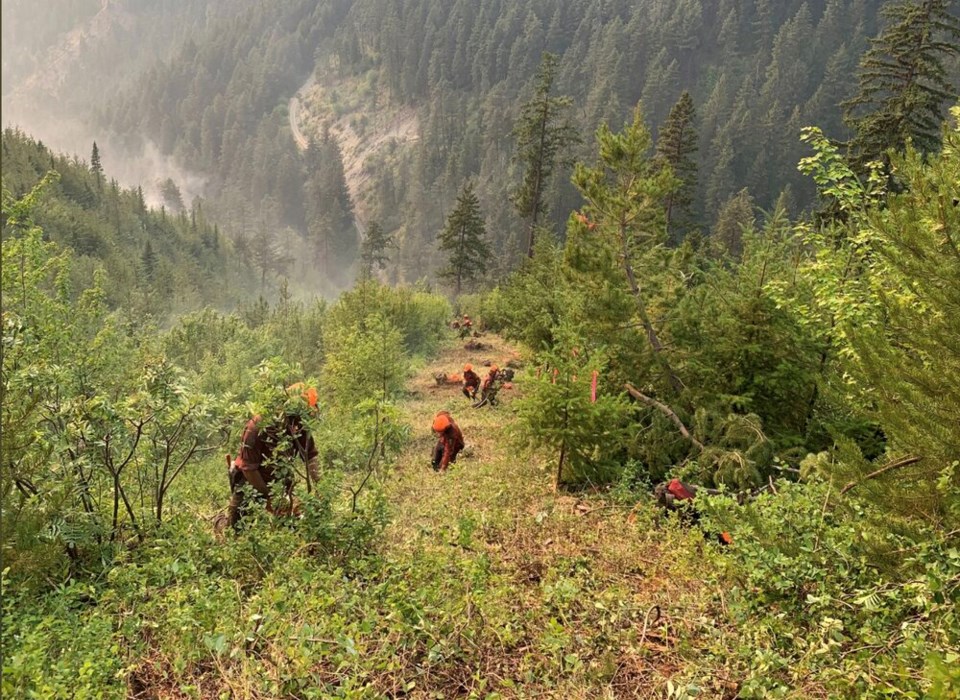A controversial 283-hectare ranch that converts Metro Vancouver’s table scraps into compost has been swept up in the same fire that devastated the town of Lytton, B.C.
It’s not clear the extent of the fire at Revolution Ranch, which sits in the Botanie Valley north of Lytton, but a spokesperson for the BC Wildfire Service said fire crews have completely avoided the area due to toxic smoke.
“It’s no different than why we don’t put our crews in a dump fire. We don’t have the PPE [personal protective equipment],” says Nicole Bonnett, the fire information officer assigned to the Lytton Creek wildfire.
Bonnett says conditions on the ground are still “really hot and really dry,” with fire activity increasing in the afternoons. That’s prevented fire crews from conducting planned ignitions to halt the fire's advance in areas away from the ranch.
“We’ve also been getting some really strong winds on-site,” she says. “That’s been a little bit challenging.”
In addition to devastating the town, the Lytton Creek wildfire had burned over 9,000 hectares by July 14. Nearly 100 firefighters, six helicopters and 23 pieces of heavy equipment have been assigned to fight the fire.
The heads of several Indian Bands in the area tell Glacier Media they have no way of getting eyes on the compost fire because an evacuation order remains in place for a large region surrounding the burned-out village.
Nicomen Indian Band Chief Donna Aljam says her community has been lucky. When they evacuated the day fire swept through the valley northeast of Lytton, fire breaks and irrigation set up on buildings meant no buildings were lost.
“As the chief of the Nicomen Band, I have to make sure everyone is secure,” says Aljam.
When the community can return is still not clear, nor whether if the compost fire will affect that timeline.
“They’re sick and tired of being here. They all want to go home,” says Aljam of her community's evacuated residents.
Glacier Media has reached out to the Thompson-Nicola Regional District emergency operations centre, but they deferred questions to the operators of the ranch and the Ministry of Environment and Climate Change Strategy.
Glacier Media has requested an interview with Revolution Ranch president and CEO Ralph McRae but has not yet received a response.
The ministry has also not yet responded to questions about whether the compost fire posed a threat to the local environment or human health.
In the past, the ranch was nominated for a Small Business BC Award for its work recycling organic waste from restaurants into compost.
It has also sparked controversy among residents.
McRae won a temporary injunction against the Lytton First Nation in 2017 over access to a road that served Revolution Ranch but ran through the band’s reserve land. In court, an interlocutory injunction blocked the First Nation from interfering with Revolution Ranch’s use of the Botanie Creek Road, prohibited the band from asserting aboriginal rights and title over the ranch, and prevented band members from harassing workers or contractors on the road.
It isn't just local First Nations that have expressed frustration over the ranch’s operations.
According to a freedom of information request published by the Ministry of Finance in 2017, the ranch’s activities led to “numerous and continued” reports from residents complaining of odours wafting off the composting facility.
“Subsequent to these complaints, the ministry found the facility to be in non-compliance as a result of fugitive odours moving off the site,” reads a 2015 background note prepared for Mary Polak, who was the Minister of the Environment at the time.
Stefan Labbé is a solutions journalist. That means he covers how people are responding to problems linked to climate change — from housing to energy and everything in between. Have a story idea? Get in touch. Email [email protected].


